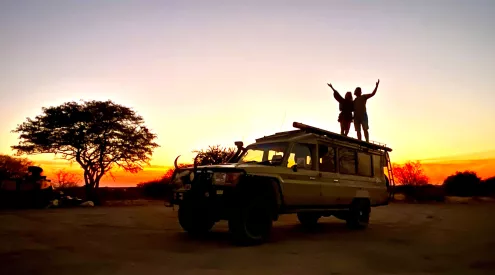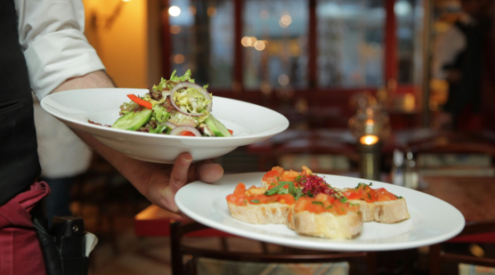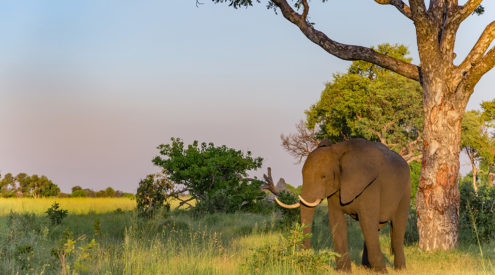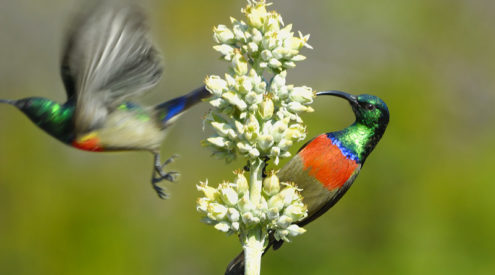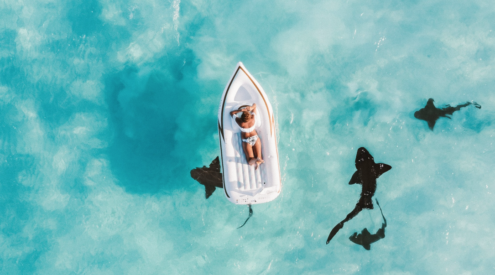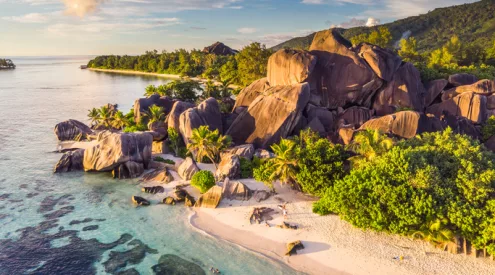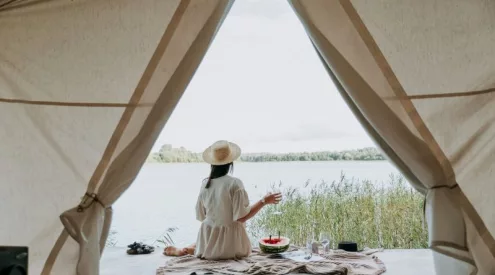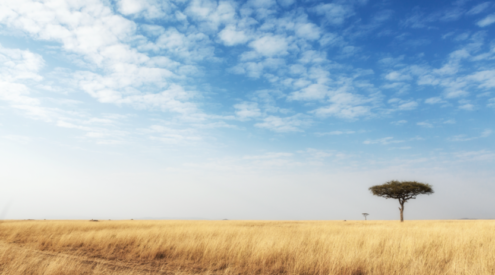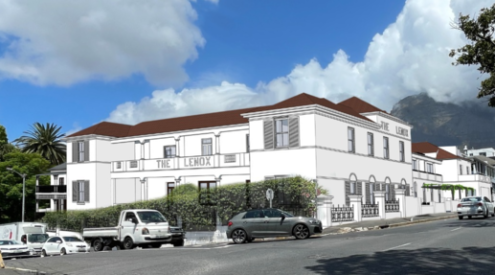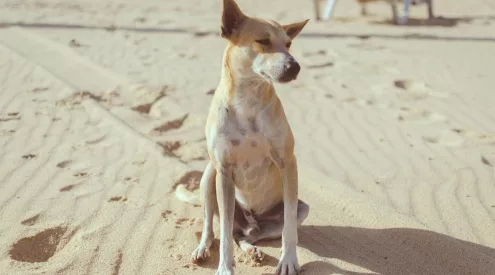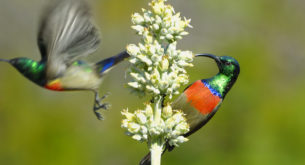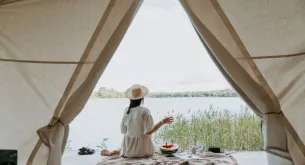Nothing beats a solid escape to nature. Just a simple hut, somewhere on a private beach or in the middle of the wilderness, and nothing to do except explore, relax and indulge. It’s true that few things can revive us as much as pure nature, and therefore it’s important to think of sustaining these natural gems for which Southern Africa is so renowned, so that we can keep on visiting them in the future.
To make your search easier, here are 10 eco-hotels in South Africa where you can enjoy a true nature escape with the added knowledge that you’re not harming that which is saving you from the hum-drum of city life. And for those heading into this hustle, there are a few inner-city eco-hotels too.
Western Cape
1. Farm 215, Uilkraal Valley
View this post on Instagram
The place: 800 hectares of private, fynbos nature reserve, enjoying panoramic views over the Agulhas Plains toward the ocean. To the West you’ll see the mountains of Gansbaai, to the East are the limestone hills of Baardskeerdersbos Valley and, walking along the trails you’ll see some of the rarest plant species of the Cape Floral Kingdom – no street lights or tarred roads in sight.
The approach: Since this is a sanctuary for the Cape Floral Kingdom, the main focus is on sustaining the region by removing alien vegetation and rehabilitating the environment. Energy is provided by solar and water power, only bio-degradable detergents are used and waste water is routed back into nature. Organic produce is used as far as possible.
The look: The rooms take the form of pods and this blend in with the natural environment. Pods are spaced out to ensure privacy and big windows and private decks bring with it beautiful views of the seemingly endless Cape Fynbos landscape.
Contact: www.farm215.co.za, [email protected], 082 097 1655
2. Platbos Forest
View this post on Instagram
The place: 55 hectares of indigenous forest, hidden in the Uilkraal Valley and privately owned by a small family. Also, this is Africa’s southern most indigenous forest and creates the feeling of being completely removed from reality as you stroll peacefully along the trails.
The approach: The owners are focused on rehabilitating the area to restore it to its natural, forested state. Trees for Tomorrow, and Trees for Tourism are two active reforestation projects and one of the major reforestation sites is on the neighbouring Farm 215. The campsite functions completely off the grid, with gas cooking stove, alien fire wood and an eco-toilet.
The look: The camp site is in a forest clearing and three large tents are furnished with beds and built on wooden platforms. The inside-outside kitchen and bathroom blend in with the forest and tree stumps are scattered around the campfire for seating.
Read more about camping in Platbos here.
Contact: www.platbos.co.za, [email protected], 076 923 3349
Gauteng
3. The Peech, Johannesburg
View this post on Instagram
The place: This hotel is situated in Melrose, an upmarket suburb of Johannesburg. Sandton is 10 minutes drive away and the Rosebank Gautrain station is 5 minutes away. Melrose is peaceful and the streets are lined with trees.
The approach: Hot water is generated by solar geysers, grey water is used for watering the garden and timers are used where possible. All recyclables get recycled, food waste gets processed into garden fertiliser and they bottle their own water on site. There is at least 90 square meters of green space per guest and all batteries are rechargeable.
The look: The hotel has a clean, unpretentious appearance and is decorated in natural colours. The building is surrounded by greenery and natural elements, like wood, feature strongly in the decor.
Contact: www.thepeech.co.za, [email protected], 011 537 9797
Eastern Cape, South Africa
4. Bulungula, Transkei
View this post on Instagram
The place: Bulungula overlooks a remote beach along the Wild Coast and is integrated with the nearby Nqileni village. Guests can get to know the locals, enjoy dinner in their mud huts or simply relax on the beaches and explore these remote surroundings.
The approach: Electricity is provided by solar power and bathrooms have rocket showers and odourless compost toilets. If guests buy food somewhere in the village, they are asked to bring as little packaging as possible with them.
The look: 10 huts are placed a little away from each other, creating a village feel. Huts are round, have thatched roofs and enjoy views of the sea and forest. Communal hammocks can be found and homemade meals are served three times a day.
Contact: www.bulungula.com, [email protected], 047 577 8900
5. The Kraal Backpackers, Wild Coast
View this post on Instagram
The place: The Kraal is situated 40km from Port St Johns and close enough to Hluleka Nature reserve to hike there. The huts are on the beachfront and guests can explore the village or relax on the beach, surf or snorkel.
The approach: The entire backpackers is completely off the grid and runs on solar energy. They also catch their own rainwater, grow their own vegetables and breed nguni chickens. You’ll see that they recycle, use biogas toilets and have a hybrid hot-water system in place.
The look: You’ll find huts of different sizes, some sleeping two and some that form dorm rooms. The huts are round and thatched and blend in with the environment because they resemble a Xhosa village. There is a communal area where guests can relax and delicious homemade meals are served at the restaurant in the village.
Contact: www.thekraalbackpackers.co.za, 082 871 4964 (bad reception – sms recommended)
Limpopo
6. Umlani Bushcamp, Timbavati Game Reserve
View this post on Instagram
The place: This classic African safari camp is situated in a remote region of the Timbavati Game Reserve which borders the Kruger National Park. Guests can explore the bush on game drives, tracking on foot and nature walks.
The approach: The huts are constructed of locally sourced reed and thatch and no electricity is used whatsoever. Light comes from candles and oil lamps.
The look: The huts blend in with the natural environment and creates the idea of a traditional village in the wilderness. With four family tents that each sleep four, four double huts that each sleep two, and an eco rondavel that sleeps two, the camp can accommodate up to 26 guests.
Contact: www.umlani.com, [email protected], 083 650 2088
7. Mashovhela, Soutpansberg
View this post on Instagram
The place: This used to be a Venda settlement that has been abandoned, and it’s situated in the Morning Sun Nature Reserve, tucked away in the Soutpansberg Mountains. Guests can explore the area on hikes and trails and search for the abundant bird life.
The approach: The roads and walking trails around the lodge follow existing wagon roadways and footpaths of the abandoned Venda village. The camp runs entirely on renewable energy sources and they’re constantly removing alien vegetation. The wood is then used for fires and to craft almost all of the furniture at the lodge.
The look: 10 circular, en suite chalets with thatched roofs are tucked away in the bush, each with its own veranda. Chalets are painted and decorated with warm, African colours and the communal area has a restaurant, bar, boma, swimming pool and shop.
Contact: www.morningsun.co.za [email protected], 079 602 5482
8. Isambane, Balule
View this post on Instagram
The place: Newly opened on Parson’s Game reserve in Balule, Isambane is a tented eco camp in big five territory. Guests can expect total peace and wonderful wildlife encounters.
The approach: The camp is completely off grid, with a small footprint and no fence. Water is provided by a borehole, which also keeps the waterhole in front of the lodge full. Electricity is turned off when guests go to sleep, preserving energy overnight.
The look: Two luxury tents and three basic tents make up the camp, with pool deck, fire boma and dining area overlooking the waterhole, where herds of elephant and other game come to drink.
Contact: www.isambanecamp.com [email protected] 078 195 7384
Kwa-Zulu Natal
9. Duma Manzi
View this post on Instagram
The place: A 5000 hectare nature reserve that is peaceful and scenic with 300 species of bird and wildlife that include buffalo, giraffe, zebra, black-backed jackal and even the elusive leopard. Game drives, nature walks, birding and fishing are popular activities, as are butterflying, frogging and stargazing – clearly, something to please all nature lovers.
The approach: To start with, the lodge is built on abandoned farm buildings to avoid further harming the environment. They use natural light, solar power and gas instead of electricity and purify their own water. The grey water is used for irrigation, showers are fitted with water reducers and all waste gets recycled. The paint is lead-free and natural materials like recycled bricks, sandstone and glass was used for construction. The kitchen uses only locally sourced, organic ingredients. Read their Green Fact File for even more eco-friendliness.
The look: The lodge blends in very well with the surroundings and suits its secluded location well. Rooms and common areas feature many natural elements like stone and thatch and there’s an elegant, yet rustic feel to it. Rooms all have private wooden decks that overlook the river.
Contact: www.dumamanzi.co.za, [email protected], 082 653 3475
10. Amangwane Camp, Kosi Bay
View this post on Instagram
The place: This is the northern most tip of South Africa’s East Coast, inside the iSimangaliso Wetland Park – a UNESCO World Heritage Site. Here you’ll find everything from swamps forests, marshes, mangroves, coastal dunes, sandy beaches, lakes and exotic wildlife. Enjoy walking trails, snorkelling and swimming with the local dolphins in this 11 000 hectare tropical paradise.
The approach: The entire camp is a joint venture with the local community and a large portion of the profit go directly to local initiatives. Bungalows are built out of reeds sourced from the local community and fitted with canvas roofs. Electricity comes from solar power and they did away with the pressure pump, rather elevating the water tank 6m above the ground to generate water pressure with gravity.
The look: The camp consist of 10, rustic-looking reed chalets, each with two twin beds and an en suite bathroom. A lapa-area creates a social place where guests can get together and share stories in the evening.
Contact: [email protected]
Tel: +27 (0) 76 659 3083
Picture: Facebook/Platbos Forest Reserve
ALSO READ

